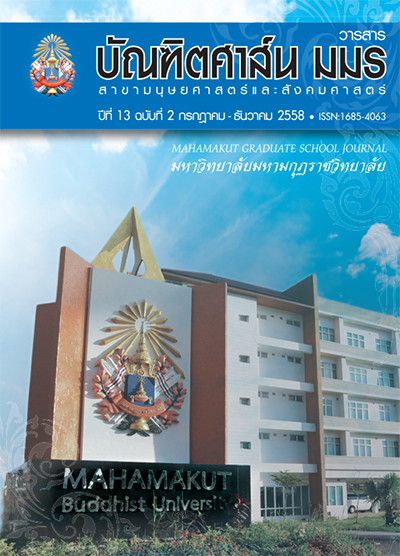การบริหารงานบุคคลตามหลักธรรมทางพระพุทธศาสนา
บทคัดย่อ
การบริหารงานบุคคล เป็นการบริหารหรือการ จัดการงานในด้านที่เกี่ยวกับตัวผู้ปฏิบัติงานภายใน องค์การ โดยมีกิจกรรมต่างๆ ตั้งแต่ การสรรหา จนถึง พ้นสภาพจากการทำงาน เพื่อให้ปัจจัยด้านบุคคล ขององค์การสามารถปฏิบัติงานได้ดีมีประสิทธิภาพ และบรรลุผลสำเร็จสมความมุง่ หมายขององคก์ าร ซึ่ง มีความสำคัญ คือเป็นหัวใจของการบริหารองค์การ เพื่อให้ประสบคามสำเร็จตามวัตถุประสงค์ หาก องค์การใดประกอบด้วยบุคคลที่มีความสามารถสูง มีความเปน็ ผูน้ ำ เห็นความสำคัญของการใชค้ น และ ปรับตัวให้ทันต่อการเปลี่ยนแปลง ความก้าวหน้า ทางเทคโนโลยี ตลอดจนการเลือกสรร การเสริม สร้างคนดีไว้ใช้งาน ย่อมเป็นประโยชน์ต่อองค์การ นั้นๆ ตลอดถึงสังคมและประเทศชาติต่อไป โดย หลักในการบริหารงานบุคคล เปน็ แนวทางที่ทำใหผู้้ บริหารสามารถบริหารงาน โดยยึดหลักความเสมอ ภาค ความสามารถ ความมั่นคง ความเป็นธรรม ทางการเมือง หลักการเสริมสร้างการพัฒนา ความ ยุติธรรม โดยมีจุดประสงค์แน่ชัดในการบริหารงาน โดยเน้นตัวบุคคลเป็นตัวชี้นำแนวทางการพัฒนา องค์การเพื่อให้บรรลุวัตถุประสงค์ตามที่ต้องการ และเกิดประสิทธิภาพอันสูงสุด ทั้งนี้ กระบวนการ ในการบริหารงานบุคคลนั้น ประกอบด้วย การ วางแผนบุคลากร การจัดบุคลากรเข้าปฏิบัติงาน การบำรุงรักษาบุคลากร การพัฒนาบุคลากร และ การให้บุคลากรพ้นจากงานเพื่อที่จะทำให้การใช้ บุคลากรในแต่ละองค์การเกิดประสิทธิภาพ และ เกิดประโยชน์สูงสุด ดังนั้นจากกระบวนการในการ บริหารงานบุคคลที่นักวิชาการหลายท่านได้สรุป และกำหนดไว้ดังกล่าว ผู้วิจัยจึงนำมากำหนดกรอบ แนวคิดและขอบเขตของการวิจัยครั้งนี้เป็น 5 ด้าน คือ การวางแผนบุคลากร การจัดบุคลากรเข้าปฏิบัติ งาน การบำรุงรักษาบุคลากร การพัฒนาบุคลากร และการให้บุคลากรพ้นจากงาน ทั้งนี้ หลักธรรมทาง พระพุทธศาสนาล้วนเป็นสิ่งที่ดี มีคุณค่าต่อการบริหาร งานทุกๆ อย่าง รวมถึงการบริหารบริหารงานบุคคล ที่จะทำให้ทุกคนในองค์การที่ได้ประพฤติปฏิบัติตาม หลักธรรมทางพระพุทธศาสนาแล้ว จะทำให้เกิด การบริหารงานที่ดี มีคุณภาพ และมีประสิทธิภาพ ตามที่องค์การนั้นตั้งไว้ จึงมีความสำคัญยิ่งที่ทุก องค์การควรมีหลักธรรมทางพระพุทธศาสนาเป็น เครื่องยึดเหนี่ยวจิตใจไว้ประพฤติปฏิบัติ อย่างเช่น ในที่นี้ประกอบด้วย 4 หลักธรรม คือ อธิปไตย 3 พรหมวิหาร 4 สังคหวัตถุ 4 และอคติ 4
เอกสารอ้างอิง
เกศินี หงสนันทน์. การบริหารงานบุคคลในราชการไทย. กรุงเทพมหานคร : โรงพิมพ์สถาบัน บัณฑิตพัฒนบริหารศาสตร์, 2518.
ธงชัย สันติวงษ์. การบริหารงานบุคคล. กรุงเทพมหานคร : ไทยวัฒนาพานิช, 2546
ธีรวุฒิ ประทุมนพรัตน์. หลักการบริหารบุคลากรทางการศึกษา. สงขลา : มหาวิทยาลัยศรีนครินทร วิโรฒภาคใต้, 2537.
ภิญโญ สาธร. หลักการบริหารการศึกษา. พิมพ์ครั้งที่ 2. กรุงเทพมหานคร : จุฬาลงกรณ มหาวิทยาลัย, 2516.
พระพรหมคุณาภรณ์ (ป.อ.ปยุตฺโต). พจนานุกรมพุทธศาสตร์ ฉบับประมวลธรรม. พิมพ์ครั้งที่ 12. กรุงเทพมหานคร : บริษัท สหธรรมิก จํากัด, 2546.
พยอม วงศ์สารศรี. การบริหารงานบุคคล. กรุงเทพมหานคร : พรานนกการพิมพ์, 2532.
__________. การบริหารทรัพยากรมนุษย์. พิมพ์ครั้งที่ 5. กรุงเทพมหานคร : คณะวิทยาการ จัดการ สถาบันราชภัฏ สวนดุสิต, 2538.
เพ็ญศรี วายวานนท์. การจัดการทรัพยากรคน. กรุงเทพมหานคร : ปิ่นเกล้าการพิมพ์, 2533.
__________. ประมวลคําจํากัดความของคําว่าการบริหารงานบุคคล. กรุงเทพมหานคร : โรงพิมพ์ สํานักทําเนียบ นายกรัฐมนตรี, 2514
สมพงษ์ เกษมสิน. การบริหารงานบุคคลแผนใหม่.กรุงเทพมหานคร : ไทยวัฒนาพานิช, 2526.
สํานักเลขาธิการคณะรัฐมนตรี. ราชกิจจานุเบกษา เล่มที่ 116 ตอนที่ 54 ก 19 สิงหาคม 2542.
กรุงเทพมหานคร : สํานักพิมพ์คณะรัฐมนตรีและราชกิจจานุเบกษา, 2542.
สํานักเลขาธิการคณะรัฐมนตรี. ราชกิจจานุเบกษา เล่มที่ 119 ตอนที่ 123 ก 19 ธันวาคม 2 545.กรุงเทพมหานคร : สํานักพิมพ์คณะรัฐมนตรีและราชกิจจานุเบกษา, 2545.
อุทัย หิรัญโต. หลักการบริหารบุคคล. กรุงเทพมหานคร : โอเดียนสโตร์, 2531.
Gary Dessler. Human Resource Management. Upper Saddle River, New Jersey : Prentice-Hall, 1997.
Mondy R. Wayne and Robert M. Noe. Human Resource Management. Upper Saddle River, New Jersey : Prentice-Hall, 1996.
ดาวน์โหลด
เผยแพร่แล้ว
รูปแบบการอ้างอิง
ฉบับ
ประเภทบทความ
สัญญาอนุญาต
บทความวิชาการและบทความวิจัยในวารสารฉบับนี้ถือเป็นความรับผิดชอบของผู้เขียนเท่านั้น บทความที่ได้รับการตีพิมพ์ในวารสารบัณฑิตศาส์น ถือเป็นลิขสิทธิ์ของมหาวิทยาลัยมหามกุฏราชวิทยาลัย ตามพระราชบัญญัติลิขสิทธิ์



